________________
JAIN: THE NOTION OF DHARMA IN JAINISM: A COMPARATIVE VIEW
way; not committing cruelty to one's dependants, servants, or animals, not drinking wine and eat meat; and so on, are all adjuncts and corollaries of the vow of non-violence in some form or the other.
The doctrine of non-absolutism, i.e. not to hurt or despise or disregard others' faith, sentiments and emotions about their dharma or views or way of life and have as much regard as possible, is indeed an inseparable limb of the fundamental principle of non-violence.
The vow of possessing limited wealth, in cash or kind (aparigraha) in order to meet the minimum necessities of food, medical care, education, protection against oppression, injustice or violence in the life of the have nots, is the third limb.
The notion of dharma in Jainism is thus based on two fundamental principles: (i) Right attitude and (ii) non-violence supported by the doctrine of non-absolutism and practice of the spirit of non-possession.
205
All said and done : finally one's own perception, realization and rejoicing in the pure and divine nature of the self or divinity-withinthe-self, is true dharma according to Jainism. The poet Joindu expressed the idea in the following words :
Neither reading (the scriptures) nor having religious books (for study) or possessing the dust remover made of peacock feathers for protecting the life of microscopic insects, neither staying in lonely hermitages or mathas, nor splitting the hair of the head and beard, none of these rituals (of the non-clad Digambara muni) lend any help in the harvest of dharma. Staying within the pure-self alone, having done away with everything else, has been called dharma by the omniscient lord. That is the dharma which carries the soul to the state of final emancipation.66
It is truly in the same spirit that Yajnavalkya enjoins upon his wife Maitreyi :
O Maitreyi ! the self within is worth being seen, being heard, being thought of and being meditated upoin. O Maitreyi ! awareness of hearing and thinking about; and by knowing this self within, everything without becomes known.67
66. Dhammu na padhiyain hoi, dhammu na potthāpicchiyain; dhammu na madhiya paesi, dhammu na mattha lunciyain. Raya-rosa be pariharivi, jo appāņi vasei; so dhammu vi Jina uttiyau, jo pancama-gai nei: Yogasāra. V. 47-48.
67. Atmā vā are draṣṭavyah, srotavyo, mantavyo, nididhyāsitavyo, Maitreyi! Atmano vä are darsanena, śravanena, matyā vijñānenedam sarvam viditam: Bṛhdāraṇyaka. 2.4.5.
Jain Education International
For Private & Personal Use Only
www.jainelibrary.org




